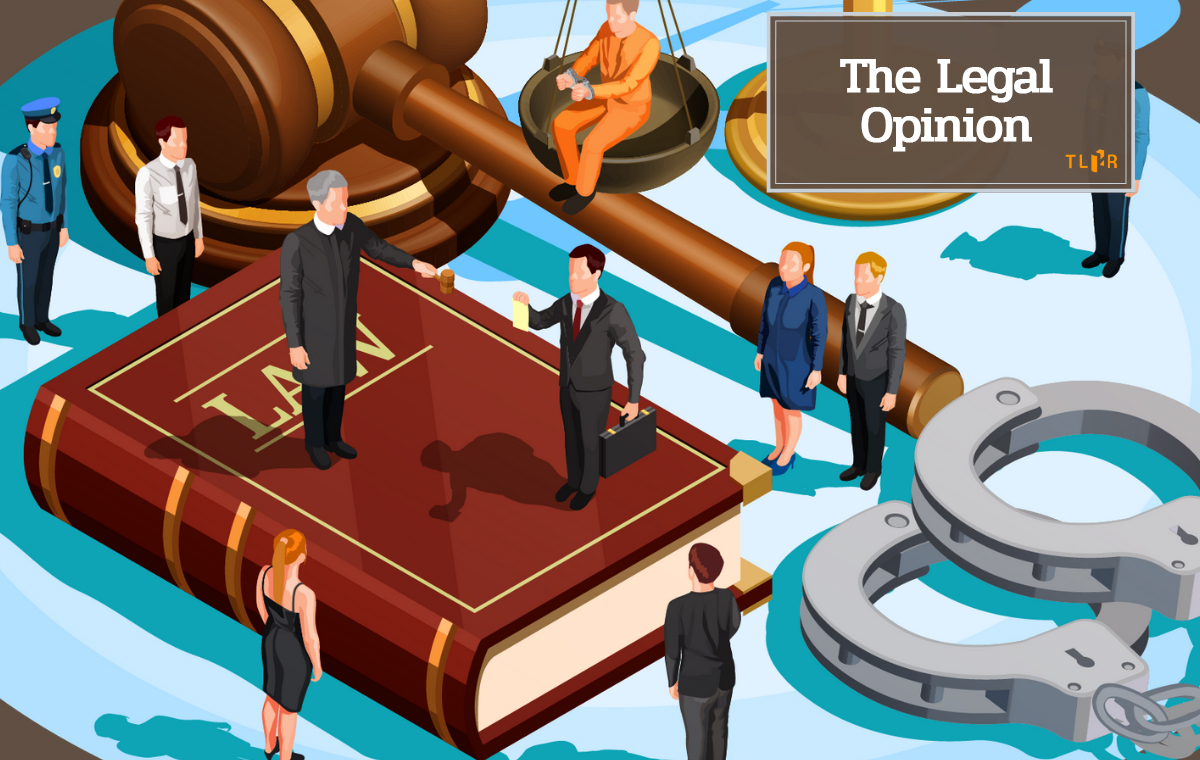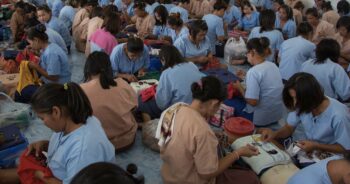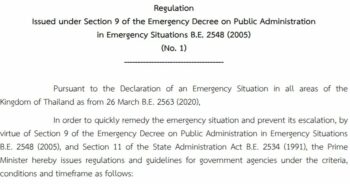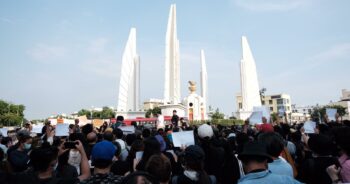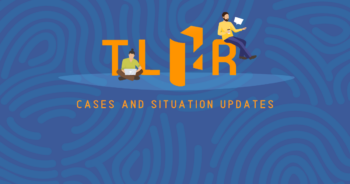By virtue of the Emergency Decree on Public Administration in the State of Emergency B.E. 2548 (2005) (“The Emergency Decree”), the Prime Minister announced the government would declare a state of emergency in all areas in the Kingdom in response to COVID-19 pandemic. The state of emergency is in effect from 26 March to 30 April 2020.
Thai Lawyers for Human Rights (TLHR) finds it necessary that the state imposes measures to promptly control and suppress the transmission of the virus, as well as appreciate the gravity of the challenges and the complex nature of the pandemic faced by Thailand and countries across the world.
We further acknowledge the enforcement of the Emergency Decree serves a clear purpose to control and limit the local transmission of COVID-19.
The exercise of power during the state of emergency to protect public health should therefore remain provisional. It should solely serve no other purpose except of the pandemic control. In order to safeguard the rights to health as well as the fundamental rights and freedoms of the people, the imposed measures which limit the rights of the people should not be used in an arbitrary manner, which may exacerbate the ongoing situation or delay the pandemic control.
Nevertheless, the Emergency Decree contains provisions which significantly restrict people’s rights and freedoms including freedom of expression, press freedom, freedom of movement, the right in judicial proceedings, etc. The Decree bestows on the authorities extensive power and limits the right to judicial review.
The declaration of the state of emergency raises concerns of the necessity and proportionality of the imposition of the Decree and of the measures per the Regulation No. 1, issued under Section 9 of the Emergency Decree on Public Administration in Emergency Situations B.E. 2548 (2005).
Legal Opinion
1. The declaration of the state of emergency shall be enforced in commensurate to the exigency of the situation, be time-bound, and when necessary and proportionate in order to achieve the stated purpose to control the transmission of the virus and for the survival of the nation;
The declaration of the state of emergency nationwide overlaps with the existing imposition of the extreme state of emergency in the provinces of Narathiwat, Yala, and Pattani which has been enforced over the past 14 years. As a result, the aforementioned areas are subjected to two concurrent state of emergency declarations which render unusual legal consequences.
The enforcement of special laws to impose a state of emergency which restricts human rights should be carried out as necessary as the exigency of the situation may require, be time-bound, and strictly imposed when necessary and in a proportionate manner in order to achieve the stated purpose to control the transmission of the virus and for the survival of the nation. The imposed measures should be subjected to regular review to ensure their necessity and guarantee they are provisionally enforced.
Recognize that certain human rights shall not be subjected to any derogation even under a state of emergency including the right to life, the right to be free from torture, the rights to a fair trial, the right to remedy, etc., pursuant to Article 4 of the International Covenant on Civil and Political Rights (ICCPR) to which Thailand is a state party and is legally bound to comply with.
The declaration of the state of emergency throughout the Kingdom overlaps with the existing imposition of the extreme state of emergency in the provinces of Narathiwat, Yala, and Pattani. As a result, the aforementioned areas are subjected to two concurrent state of emergency declarations which render unusual legal consequences. The extreme state of emergency was declared on 20 July 2005 and has been renewed for over 14 years till date. The imposed measures under such state therefore could be taken as normal measures rather than special measures under a state of emergency. The administrative branch of government has been the sole oversight body of the necessity of such declaration.
Forward, amendments must be made to the Emergency Decree in order to allow the House of Representatives to review its measures and the necessity of renewal of the declaration of the state of emergency to uphold people’s rights and freedoms.
2. Measures issued under Section 9 of the Emergency Decree are beyond the power provided by the law. Some of the imposed measures include vaguely worded, unclear and ambiguous practical and legal guidelines and advices which may carry effect on their legality.
Section 9 states that in case of necessity in order to remedy and promptly resolve an emergency situation or to prevent the worsening of such situation, the Prime Minister shall have the power to issue the following regulations:
(1) to prohibit any person from departing from a dwelling place during the prescribed period, except with the permission of a competent official or being an exempted person;
(2) to prohibit the assembly or gathering of persons at any place or the commission of any act which may cause unrest;
(3) to prohibit the press release, distribution or dissemination of letters, publications or any means of communication containing texts which may instigate fear amongst the people or is intended to distort information which misleads understanding of the emergency situation to the extent of affecting the security of state or public order or good moral of the people both in the area or locality where an emergency situation has been declared or the entire Kingdom;
(4) to prohibit the use of routes or vehicles or prescribe conditions on the use of routes or vehicle;
(5) to prohibit the use of buildings or enter into or stay in any place;
(6) to evacuate people out of a designated area for the safety of such people or to prohibit any person from entering a designated area.
Regulations under paragraph one may prescribe a time condition for the compliance of Regulations or conditions for the exercise of functions by the competent official, or authorize a competent official to designate an area and additional details, so as not to perform any act which causes unreasonable hardship to the people.
A regulation has been issued invoking power under Section 9 of the Emergency Decree and Section 11 of the State Administration Act B.E. 2534 (1991) and contains prohibitions including:
Prohibition of entry into risk areas, closure of risk places prone to the transmission of the virus, closure of the point of entry into the Kingdom, prohibition of the stockpile of goods, prohibition of assembly, and prohibition of news reporting, the offence of which carry punishment by law.
Some measures were issued in form of practical and policy advices which, despite their convenient nature to codify all measures in one legislation, may cause confusion in regard to their source of power and enforcement.
Several measures can be enforced through other existing laws without invoking power under the Emergency Decree.
2.1 Prohibition of entry into risk areas prone to the transmission of the virus(Articles 1 and 2 of Regulation No.1) can be imposed through invoking other existing laws.
- Provincial governors have the power under Section 35 of the Communicable Diseases Act E. 2558 to impose such measures and its punishment clause prescribed in Section 52 of the same charter. By imposing the penalties pursuant to the Emergency Decree, alleged offenders may face unnecessarily higher penalties for the same crimes.
2.2 Closure of point of entry into the Kingdom (Article 3(6)) of Regulation No.1 and “Fit to Fly Health Certificate” are in breach of the principle of necessity, do not effectively serve the purpose to prevent the transmission of COVID-19, as well as create unwarranted burden.
- The requirements that Thai nationals shall apply for a certificate of entry into the Kingdom from the Royal Thai Embassy or the Royal Thai Consulate in their country of residence and obtain a Fit to Fly Health Certificate to enter the Kingdom by air are in breach of the principle of necessity since they do not effectively serve the purpose to prevent the transmission of virus as the certificates could not guarantee that the persons are free of COVID-19. Further, the requirements incur unwarranted burden on Thai nationals to acquire a medical certificate while not presenting any virus-induced symptoms.
- The Section impedes access to the absolute right pursuant to Section 39 of the Constitution which provides that no person of Thai nationality shall be prohibited from entering the Kingdom.
- The requirement that Thai nationals shall be subjected to a period of quarantine upon entering into the Kingdom per Article 11 of the Regulation No.1 should be sufficient for the prevention of virus.
2.3 The Prohibition of the stockpile of goods (Article 4 of Regulation No.1) falls outside the scope of Section 9 of the Emergency Decree
- Such requirement falls outside the scope of Section 9 of the Emergency Decree which bestows on the Prime Minister the power to prohibit any person from leaving their residence, and prohibit any assemblies, news reporting, the use of routes or vehicles, the use of buildings as well as the power to evacuate people out of a designated area, except the power to impose prohibition of the stockpile of goods.
- The Prohibition of the stockpile of goods can be enforced under the Price of Goods and Service Act B.E.2542 (1999), the Commodities Stockpile Survey Act B.E. 2497 (1954) and other relevant laws without invoking the Emergency Decree.
- If it is necessary to codify all measures in one law, the Prime Minister can do so by exercising the state administration power without invoking the Emergency Decree’s Section 9 to issue the Regulation and to prescribe punishment per Section 18 of the Decree. The imposition of punishment under Articles 4 and 15 of Regulation No.1 may carry effect on the legality of the provisions.
2.4 Prohibition of any assemblies of persons (Article 5 of Regulation No.1) lacks clarity in regard to the prohibited activities and imposes restrictions beyond necessary to prevent the transmission of virus.
- Article 5 which prohibits a person “to assemble, to carry out activities, or to gather at any place that is crowded, or to commit any act which may cause unrest” raises concerns of the nature of the phrase “activities” which does not appear in the definition of assemblies pursuant to Section 9 of the Emergency Decree.
- In addition, Article 14 provides advices on the organization of other activities, traditional social events, and ceremonial events organized by government agencies as appropriate under the virus prevention measures. Such article therefore causes confusion to the public which activities are allowed to proceed, since Article 5 imposes strict prohibitions while Article 14 appears to be advisory provisions.
- The clause “any act which may cause unrest” may constitute an invocation of the Emergency Decree to impose measures beyond necessary to prevent the transmission of virus, since the Decree provides excessive power in situations which affect national security. In the context of the prevention of the transmission of virus, the state must impose measures strictly appropriate to address the situation identified.
2.5 Measure on news reporting (Article 6 of Regulation No. 1) is imposed to restrict the freedom of opinion and information accessible to the public to be informed of the situation of COVID–19
- Article 6 “It is prohibited to present or disseminate news, through any media channel, containing content or information of the situation of Coronavirus(COVID-19) which is false or may instigate public fear, or to intentionally distort information which may cause misunderstanding of the emergency situation to the extent of affecting the public order or good morale of the people. In such cases, officials shall issue a warning to cease such acts or order to correct such news, or in cases where there are serious consequences, shall take a legal action per the Computer Crime Act B.E. 2550 (2007) or the Emergency Decree on Public Administration in Emergency Situations B.E. 2548 (2005).”
- Article on the news reporting which includes the word “false” could be subjected to extensive interpretation by public officials to include matters whose facts has yet to be established, any misunderstanding or other cases.
- The phrase “where there are serious consequences” which allows for a prosecution pursuant to the Computer Crime Act B.E. 2550 is beyond expectation as to which case constitutes a situation where there are serious consequences.
- Such measure can therefore instigate fear as well as impede access to and the right to be timely informed, and to share information in regard to the situation of COVID-19, necessary to the prevention and suppression of the pandemic. The impediment of such right may cause more damage to the public than to help prevent the pandemic.
- Over the past two months saw incidents of miscommunication by both the state and public. Efforts have been made to restrict information, for example, in the response to Matthew Dean’s news revealing his positive test of COVID-19 and the prosecution of Danai, a graffiti artist, for an offence under the Computer Crime Act following his claim of measures he encountered upon arrival at the Suvarnabhumi Airport.
2.6 Measures to maintain public order (Article 10 of Regulation No.1) which should fall under the authority of the police, have instead been appointed under the command of the Commander-in-Chief, a post which often oversees emergency situations in regard to national security.
- Article 10 states that the Royal Thai Police deploys officers on duty or establishes check points on roads, transportation routes, and terminals or stations in Bangkok. It furthers provides power to the Chief Operating Officer to remedy the emergency situation in matters relating to security, and the Royal Thai Police to take actions as appropriate in other provinces except Bangkok. The Royal Thai Police may request for cooperation from military officers, officers of the Internal Security Operations Command (ISOC), or volunteers. Immediate legal action shall be taken against the offences.
- According to the Prime Minister’s Directive No. 4/B.E.2563 (2020), the Commander-in-Chief is provided as the Chief Operating Officer responsible for remedying the emergency situations in matters relating to security.
- The maintenance of public order is an internal affair and should fall under the command of a civilian body. The Royal Thai Police therefore should be appointed as the body in charge, with the deployment of military personnel or volunteers when additional resources are required.
- Regarding the legal action taken against the alleged offenders, the authorities should prioritize the necessity to prevent and control the virus transmission in a timely manner. The authorities arrested and took into custody Danai, a graffiti artist, who was charged with an offence under the Computer Crime Act following his claim of measures he encountered upon arrival at the Suvarnabhumi Airport, while he was under the 14-day quarantine. As a result, the arresting officials, individuals involved with transporting the suspect to Bangkok, officials of the Technology Crime Suppression Division (TCSD), attorneys, court officials, fellow suspects, and judges are vulnerable to the virus infection if Danai later tests positive. This could further cause extensive effects on other individuals and those in the judicial process.
2.7 Measures on disease prevention (Article 11 of Regulation No.1) may contain provisions which infringe on the right to privacy and freedom of movement.
- Article 11 requires the cleaning, wearing of face masks, disinfection, social distancing, limitation of the number of participants and reduction of contact time.
- The “officials” may impose additional measures utilizing tracking applications via mobile telephones, and may impose a minimum of 14 days’ quarantine measure in accordance with laws relevant to contractible diseases for “particular groups of people” or “particular individuals” as necessary.
- The terms “officials,” “particular groups of people” and “particular individuals” are yet to be defined as to which persons will be included. These terms are therefore subjected to broad interpretation.
- The surveillance and quarantine of individuals severely restrict the right to privacy and freedom of movement. Such measures should be carefully enforced to ensure they strictly serve the purpose of disease prevention.
3. Penalties of the Regulation (Article 15 of Regulation No.1) raise concerns of overlapping definition and enforcement of penalties with other existing laws.
Article 15 provides that any person who violates measures in Articles 1 – 6 (prohibition of entry, closure of risk places prone to the transmission of the disease, closure of point of entry into the Kingdom, prohibition of the stockpile of goods, prohibition of assemblies, prohibition of news reporting) shall be punishable by a maximum imprisonment of two years or a fine not exceeding 40,000 Thai Baht (approx. USD 1,225) or both under Section 18 of the Emergency Decree, and shall be punishable by other relevant laws.
Violation of other measures is not liable punishable by provisions of the Emergency Decree, however are punishable by other relevant laws.
Certain measures are beyond the scope of the Emergency Decree, and are therefore not punishable pursuant to the penalties prescribed in Section 18 of the Decree.
Certain measures, including measures on particular groups of people and disease prevention measures, appear to be of both advisory and instructive nature. They carry no penalties and cannot be issued by invoking the Emergency Decree. Such measures could therefore cause confusion and misunderstanding later.
4. Officials per the Prime Minister’s Directive No. 4/B.E.2563 (2020) and their liability
Section 16 of the Emergency Decree provides that a regulation, announcement, order or an act under the Decree shall be subjected to neither the Administrative Procedure Act nor the law on the Establishment of the Administrative Court and Administrative Court Procedure.
Section 17 provides that officials and persons acting with powers and in duties as an official under the Decree shall not be subjected to civil, criminal or disciplinary as a result of their actions to suppress or present an illegal act, within reasons, and of necessity. The Section however does not preclude the right of a victim to seek compensation from a government agency under the law on Liability for Wrongful Act of Official
Officials per the Emergency Decree perform duties nationwide: The Prime Minister’s Directive No. 4/B.E.2563 (2020) on the appointment of Chief Operating Officer and officials responsible for remedying the emergency situation provides that police, military and civil officials appointed or acting on duty in areas designated pursuant to the state of emergency declaration, officials under the Emergency Decree.
Power derived from 40 legislations is transferred to the Prime Minister:According to the Prime Minister’s Announcement that the assignment of power and duties of ministers shall belong to the Prime Minister, power derived from 40 statutory laws is transferred to solely the Prime Minister.
Given the territorial scope of the law, the duties, the powers and the number of officials involved with the enforcement of 40 legislations are extensive with limited checks and balances of such regulations, orders and acts of the officials.
In other word, no legal actions could be taken to the Administrative Court. Officials shall not be liable as provided by Section 17 of the Decree. The law enforcement in such situation should be carried out carefully, with necessity, and within a certain period of time in order to avoid causing unwarranted infringement on people’s rights and freedoms and to promptly achieve the purpose of preventing the transmission of COVID-19.
Thai Lawyers for Human Rights (TLHR) recognizes the gravity of the challenge and the complex nature of the COVID-19 pandemic faced by Thailand and countries across the world. We further acknowledge the enforcement of the Emergency Decree serves the sole purpose of the COVID-19 pandemic control and suppression. The exercise of power during the state of emergency to protect public health should therefore be provisional and solely serve no other purpose except of the pandemic control. In order to safeguard the rights to health as well as the fundamental rights and freedoms of the people, the imposed measures which limit the rights of the people should not be used in an arbitrary manner, which may exacerbate the ongoing situation or delay the pandemic control.
